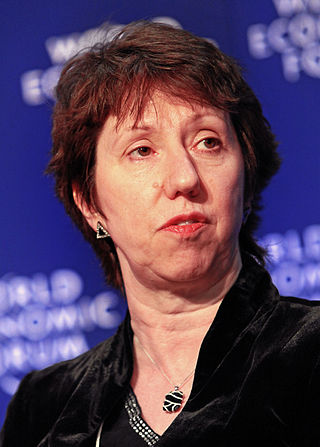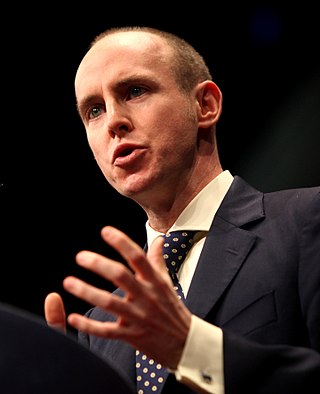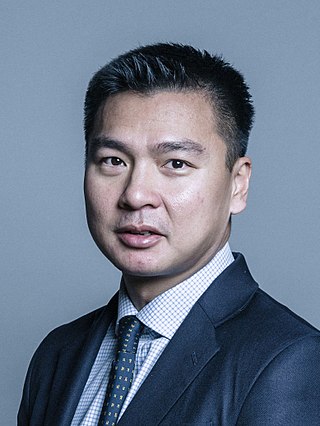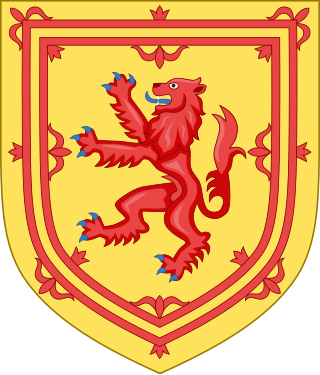
Peter Bruce Lilley, Baron Lilley, PC is a British politician and life peer who served as a cabinet minister in the governments of Margaret Thatcher and John Major. A member of the Conservative Party, he was Member of Parliament (MP) Hitchin and Harpenden from 1997 to 2017 and, prior to boundary changes, St Albans from 1983.
The Bruges Group is a think tank based in the United Kingdom. Founded in 1989, it advocates for a restructuring of Britain's relationship with the European Union and other European countries. Its members and staff campaign against the notion of an "ever-closer union" in Europe and, above all, against British involvement in a single European state. The group is often associated with the Conservative Party, including MPs such as Iain Duncan Smith, Daniel Hannan, John Redwood, and Norman Lamont. However, it is formally an independent all-party think tank, and some Labour MPs and peers have cited the publications or attended the meetings of the Bruges Group through the years, such as Frank Field, Gisela Stuart, Lord Stoddart of Swindon and Lord Shore of Stepney.

Catherine Margaret Ashton, Baroness Ashton of Upholland, is a British Labour politician who served as the High Representative of the Union for Foreign Affairs and Security Policy and First Vice President of the European Commission in the Barroso Commission from 2009 to 2014.

Dr Timothy Charles Ayrton Tannock is a British psychiatrist, Conservative Party politician and former Member of the European Parliament (MEP) for London.

Daniel John Hannan, Baron Hannan of Kingsclere is a British writer, journalist and former politician serving as an adviser to the Board of Trade since 2020. He is the founding president of the Initiative for Free Trade. A member of the Conservative Party, he was a Member of the European Parliament (MEP) for South East England from 1999 to 2020.

Malcolm Everard MacLaren Pearson, Baron Pearson of Rannoch is a British businessman and former Leader of the UK Independence Party (UKIP). He sits as an independent member of the House of Lords. A Eurosceptic, he was a staunch supporter of pro-Brexit campaign Leave Means Leave.

Euroscepticism in the United Kingdom is a continuum of belief ranging from the opposition to certain political policies of the European Union to the complete opposition to the United Kingdom’s membership of the European Union. It has been a significant element in the politics of the United Kingdom (UK). A 2009 Eurobarometer survey of EU citizens showed support for membership of the EU was lowest in the United Kingdom, alongside Latvia and Hungary.

Norman Roy Blackwell, Baron Blackwell is a British former businessman, public servant, Conservative politician, campaigner and policy advisor.

Andrew Adonis, Baron Adonis, is a British Labour Party politician and journalist who served in HM Government for five years in the Blair ministry and the Brown ministry. He served as Secretary of State for Transport from 2009 to 2010, and as Chairman of the National Infrastructure Commission from 2015 to 2017. He was Chair of the European Movement, from March 2021 until December 2022 having previously served as Vice-Chairman from 2019 to 2021. He is currently a columnist for The New European.
Ruth Jane Lea, Baroness Lea of Lymm, is a British parliamentarian and pro-Brexit political economist.

David George Hamilton Frost, Baron Frost is a British former diplomat, civil servant and politician who briefly served as a Minister of State at the Cabinet Office between March and December 2021. Frost was Chief Negotiator of Task Force Europe from January 2020 until his resignation in December 2021.

Nathanael Ming-Yan Wei, Baron Wei, also known as Nat Wei, is an English social entrepreneur with an interest in social reform. He is the first British-born person of Hong Kong origin to have become a member of the House of Lords, sitting as a Conservative, and was the youngest member of the House from 2010 to 2016. He was also previously an adviser to the UK Government on their Big Society project.

The External relations of the Bailiwick of Jersey are conducted by the External Relations department of the Government of Jersey. Jersey is not an independent state; it is a British Crown dependency, so internationally the United Kingdom is responsible for protecting the island and for consulting Jersey on international trade agreements but it is not a British territory.

Brexit was the withdrawal of the United Kingdom (UK) from the European Union (EU) at 23:00 GMT on 31 January 2020. The UK is the only sovereign country to have left the EU or the EC. The UK had been a member state of the EU or its predecessor the European Communities (EC), sometimes of both at the same time, since 1 January 1973. Following Brexit, EU law and the Court of Justice of the European Union no longer have primacy over British laws, except in select areas in relation to Northern Ireland. The European Union (Withdrawal) Act 2018 retains relevant EU law as domestic law, which the UK can now amend or repeal. Under the terms of the Brexit withdrawal agreement, Northern Ireland continues to participate in the European Single Market in relation to goods, and to be a de facto member of the EU Customs Union.

Vote Leave was a campaigning organisation that supported a "Leave" vote in the 2016 United Kingdom European Union membership referendum. On 13 April 2016 it was designated by the Electoral Commission as the official campaign in favour of leaving the European Union in the Referendum.

A second referendum on independence from the United Kingdom (UK) has been proposed by the Scottish Government. An independence referendum was first held on 18 September 2014, with 55% voting "No" to independence. The Scottish Government stated in its white paper for independence that voting Yes was a "once in a generation opportunity to follow a different path, and choose a new and better direction for our nation". Following the "No" vote, the cross party Smith Commission proposed areas that could be devolved to the Scottish Parliament; this led to the passing of the Scotland Act 2016, formalising new devolved policy areas in time for the 2016 Scottish Parliament election campaign.

Between 2017 and 2019, representatives of the United Kingdom and the European Union negotiated the terms for Brexit, the planned withdrawal of the UK from the EU. These negotiations arose following the decision of the Parliament of the United Kingdom to invoke Article 50 of the Treaty on European Union, following the UK's EU membership referendum on 23 June 2016.

55 Tufton Street is a four-storey Georgian-era townhouse on Tufton Street, in Westminster, London, owned by businessman Richard Smith. Since the 2010s the building has hosted a network of libertarian lobby groups and think tanks related to pro-Brexit, climate science denial and other fossil-fuel lobby groups. Some of the organisations it houses have close connections with those at nextdoor 57 Tufton Street, including the Centre for Policy Studies and CapX.

"Singapore-on-Thames", sometimes "Singapore-upon-Thames", is a term for a possible model of the British economy after Brexit. Under it, the United Kingdom would greatly diverge from its neighbours in the European Union (EU), offering businesses low tax rates and a much lighter regulatory climate as an alternative, much like Singapore does within its region of Asia. The term arose in the media as a characterisation of remarks made by Chancellor of the Exchequer Philip Hammond to a German newspaper in early 2017, to the effect that if the EU refused access to its single market on terms favourable to the UK then the UK would necessarily have to change its economic system to one less like EU countries in order to remain globally competitive, an outcome he did not want.

The Trade Act 2021 is an Act of the Parliament of the United Kingdom to make provision about the implementation of international trade agreements. It was introduced to the House of Commons on 19 March 2020 by the Secretary of State for International Trade Liz Truss, and introduced to the House of Lords on 21 July 2020 by Lord Grimstone of Boscobel. It received royal assent on 29 April 2021.















